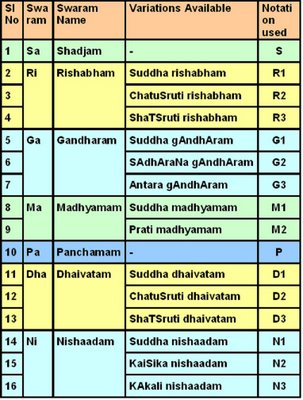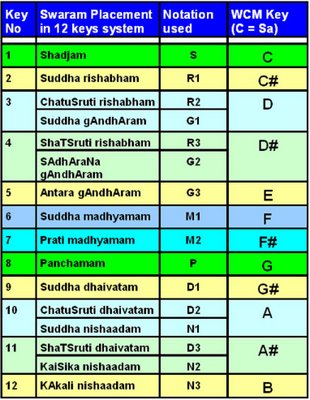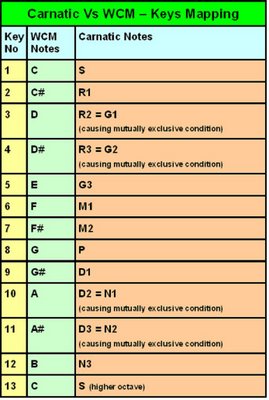As many of you already aware, Carnatic Scheme has 7 notes, Sa, Ri, Ga, Ma, Pa, Dha, Ni
Now, in WCM system we know that there are 12 keys (black and white) for an octave.
But in reality Carnatic scheme has 16 notes in total between Tonic to Ocatve !
While Sa and Pa has no variations, Ma has 2 variations and the balance Ri, Ga, Dha and Ni have 3 variations each, totalling to 16 notes between an Octave.
These are tabulated below:

However, the variation between certain notes like (R2 & G1) , (R3 & G2) , (D2 & N1) and (D3 & N2) are so minute, you can ignore that variation and represent these 16 keys in the 12 key system as below:

For our discussion purposes, let us presume that middle “C” as our Fixed Tonic as required by Carnatic. We have to use these 12 notes to form a pattern of Carnatic Scheme. How many notes to select…?
Carnatic scheme at the outset demands 7 notes (or less…! )
(Remember WCM demands strictly 7 notes and nothing less or more is accepted..! ).
Let us analyse the case of 7 notes selection ( viz. Sa Ri Ga Ma Pa Dha Ni) out of 12 notes available.
Also, there are certain restrictions of notes posed while selection :
Certain notes are must (Sa & Pa) and the notes which have alternatives (Ri, Ga, Ma, Dha & Ni ) you shall select within that alternatives satisfying certain mutually exclusives conditions.
Conditions :
Sa and Pa have no variations and must be selected.
Ma is having 2 variant and select any one at a time.
Ri, Ga, Dha and Ni are having 3 variants each out of which you select any one variant for each.
(At the same time in certain variants, mutually exclusive conditions arise between Ri & Ga as well as Dha & Ni due to the adoption of the method of 16 notes represented in the 12 Keys.)
To explain the above visually, let me give the Comparative position of the 12 keys - Carnatic Vs WCM as below : (Taking C as the Tonic, Sa ) To simplify let us also use only the Sharps

For example…..
- If R1 is selected, we have 3 options for Ga …….as G1 or G2 or G3.
- If we select R2, our options for Ga is restricted to ……..either G2 or G3 only (as G1 is ruled out by R2 selection)
- If R3 is selected, our option for Ga is restricted to…… G3 only, (as G1 is crossed and G2 is ruled out by R3 selection)
Similarly
- If D1 is selected, we have 3 options for Ni …….as N1 or N2 or N3.
- If we select D2, our options for Ni is restricted to ……..either N2 or N3 only (as N1 is ruled out by D2 selection).
- If D3 is selected, our option for Ni is restricted to…… N3 only, (as N1 is crossed and N2 is ruled out by D3 selection)
With the above set of conditions we can start with our Carnatic Raga Pattern Formation which is purely as per mathematical topic of "Permutation & Combinations".
We can see that in our next session.

1 comment:
CSR Sir,
eagerly awaiting lesson 44.
Your last post was on 12 Aug.
Please please please continue your posts
Post a Comment